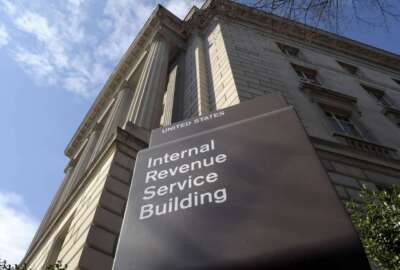It looks like when the phone rings next tax season, someone will be there to answer
In today's Federal Newscast, the IRS just might have someone to answer your call next tax season.
Best listening experience is on Chrome, Firefox or Safari. Subscribe to Federal Drive’s daily audio interviews on Apple Podcasts or PodcastOne.
- Reciprocity may no longer be a dirty word in federal IT circles. The cloud security program known as FedRAMP is proving that sharing of data and trust in the processes is paying off. FedRAMP reported that the re-use of cloud security packages continued to increase across government in fiscal 2022, rising to more than 4,500 from more than 2,800 a year ago. FedRAMP also reported that the Joint Authorization Board, or JAB, has approved 282 cloud services for use by agencies and another 82 are in process. The average time to get through the JAB is now four and a half months.
- Enterprise risk management is taking hold in new ways across the government. More agencies than ever are holding members of the Senior Executive Service accountable for managing risk. The eighth annual enterprise risk management survey from the Association of Federal Enterprise Risk Management and Guidehouse found 27% of all respondents say managing risk is part of an SESers’ performance plan. That is an increase from 10% a year ago. Respondents from 62 agencies also said that the workforce is their top risk over the next 5 years, replacing cybersecurity from the previous years’ surveys. But respondents said cybersecurity remains the top risk most of their top level management focuses on.
- After four years of back-and-forth in the contracting and bid protest process, it looks like the Defense Department finally has a green light to move ahead with a massive overhaul of its moving system. The Court of Federal Claims ruled in favor of DoD yesterday, rejecting protests from two losing bidders. DoD said it plans to start implementing the 20-billion-dollar Global Household Goods contract next year, but it’s still possible that the losing bidders will continue to challenge the award before a federal appeals court. (Federal News Network)
- The IRS just might have someone to answer your call next tax season. The agency announced it hired 4,000 new customer service representatives to help answer phones and provide other services. The expansion is part of a push to staff up as a result of funding from the Inflation Reduction Act. The IRS plans to add another 1,000 customer service representatives by the end of the year. The new hires are in various stages on being onboarded and trained in preparation for the 2023 tax filing season.
- The Office of Personnel Management removed two positions from a list of federal jobs that drastically need help with recruitment. Out of five different mission critical occupations across the government, the three jobs that remain on the high-risk list for federal recruitment are human resources, acquisition and cybersecurity employees. OPM recommends taking the economist and auditor roles off the high-risk list. Although OPM says recruitment will always be needed for those two positions, agencies have made significant improvements to hire more federal employees in those fields.
- The Department of Health and Human Services is using additional funding to focus on recruitment in areas across the U.S. that have health care workforce shortages. The Government Accountability Office said, for example, HHS has focused on hiring and retention in rural areas, as well as areas with mental health care shortages. HHS received an additional $100 million through the American Rescue Plan, on top of the appropriated $112 million in fiscal 2021, to support its Behavioral Health Workforce Education and Training Program.
- The Federal Communications Commission is turning to new rules to protect emergency alert systems from cyber attacks. The FCC proposal would require emergency alert operators, like radio and TV broadcasters, to report cyber incidents to the commission within 72 hours. The rules would also require broadcasters to annually certify that they have cybersecurity risk management plans.
- The Cybersecurity and Infrastructure Security Agency released new goals for critical infrastructure. CISA published cybersecurity performance goals for critical infrastructure this week. The goals are intended to help companies of any size better secure their networks, devices and data. The measures are based on the National Institute of Standards and Technology Cybersecurity Framework. The goals are voluntary, but the Biden administration is increasingly turning to regulatory agencies to enforce minimum cyber standards for critical infrastructure.
- The Smithsonian Board of Regents announced recommendations for the sites of the National Museum of the American Latino and the American Women’s History Museum. The spots selected are adjacent to the U.S. Holocaust Memorial Museum and close to the Agriculture Department. Legislation passed by Congress authorized the museums in 2020, but further congressional approval on the site selection is required before ground can be broken. A total of 25 perspective sites were evaluated.
Copyright © 2025 Federal News Network. All rights reserved. This website is not intended for users located within the European Economic Area.
Eric White
Eric White is news anchor and Federal Drive producer at Federal News Network.
Follow @FEDERALNEWSCAST




